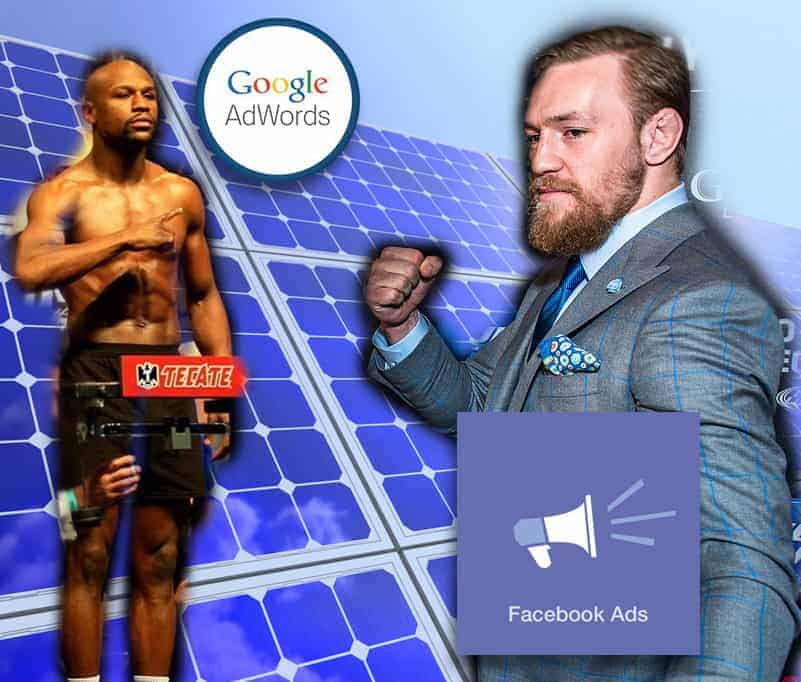Measuring Up Competing Ad Platforms
Like an epic Mayweather vs. McGregor battle royale, the first thing that everyone wants to know is the hard statistics. How much do the competitors weigh? What’s their reach? What are the odds?
Solar companies seeking the best fit for their company’s advertising strategy would want to measure up the options when deciding how and where to invest advertising dollars. So let’s look at Facebook and Google PPC like two great athletes and see what they can do.
1. Targeting
Facebook and Google ad networks both have the ability to target any area, large or small. Whether you want to go after the entire country or a small town, both platforms can do this. On paper, Facebook may have the advantage when it comes to detailed targeting. For example, you can target income and education level (yes, you can target these metrics!).
But a word of warning: some of the advanced targetings in Facebook can come at the price of narrowing your potential audience down too much. The Facebook algorithm tends to perform better with larger audience pools.
2. Analytics
Again, and I’m sure you won’t be surprised, both platforms offer customizable analytics so that you can track the specific KPIs that are important to you. With Facebook, you can actually gather more detailed information, and use that data for retargeting campaigns, which is easier to set up. In general, the Facebook ad platform and analytics panels are more intuitive and easier to manage.
3. Cross-Platform Reach
Here, there’s no contest. Google Adwords and Google Display Ads possess the world’s deepest reach by virtue of their ability to take advantage of the Google Display network. There are hundreds of thousands of small members with niche sites participating in Google AdSense and hundreds of major companies as well. This means that Google can display your ads on websites and blogs across the web and where people will find ads that are contextual to their searches and interests.
In addition, display network ads distributed across the web compliment your text-based ads appearing in the SERPS, allowing you to canvas (if budget allows) vast swathes of the world wide web. This combination can be quite expensive, but with the right ads, can be very powerful.
Facebook doesn’t have this reach. Sadly, Facebook ads are confined to the cramped prison of Facebook itself, a platform with ONLY 2 BILLION active users. Oh wait, I forgot Instagram, so, that’s like half the internet now… maybe never mind about Facebook’s limited reach.
4. Control
Another point goes to Google Ads here due to its somewhat traditional approach to keywords. In the case of AdWords, you can specify keyword match types. You can choose “exact”, “broad”, “modified broad”, and “phrase match” keyword terms (most people target several of these during the testing phase). This gives you a lot of control over when your ads are shown.
Control is particularly important because Google Adwords and Display Ads are typically more expensive than Facebook ads. Without the ability to control when Google serves your ads, you can blast through your ad budget in a flash. When it comes to Facebook ads, the ability to define when ads are served isn’t possible.
The reason is the complexity of personal profile data that Facebook needs to sift through and measure in order to make the best decisions about who to serve your ad to and to deliver the best results. The Facebook algorithm assumes control of most of the parameters of your ad deliverability within Facebook.
5. Cost
Similar guiding principles govern both Google and Facebook ads and determine how much you pay for a click. Relevancy is a major factor across both platforms as is quality. Both make use of an auction model for establishing the value of an ad and both will increase or decrease what you pay based on the performance of the ad.
At the end of the day, Google ads can vary widely based on the average price per keyword. In most cases, they will be more expensive than Facebook ads. Some competitive keywords can be very expensive and are better left alone entirely.
Another point to mention: Facebook will almost certainly give you a lower cost per click. But it is important to compare the cost per click relation to the cost per action. CPA is when someone takes the desired action of your ad campaign. That may be scheduling a call, submitting a form, or simply viewing a page. Whatever action you are after, the platform that performs the best is the one that costs the least in relation to both of these metrics.
Testing is the only way to confirm the answer to this question on any given campaign.
6. Performance
Facebook ads and Google ads are both extremely valuable and likely an essential component of your company’s growth. In some instances, Facebook and Google ads can be used for the same reasons.
A case in point is E-commerce. With Ecommerce, Facebook can be a great platform to actually sell products, thanks to its more visual-dependent approach. Trending items and impulse purchases can happen and can scale with Facebook and Instagram ads alone. But for higher ticket sales, Facebook will not be the best place to scoop up new customers. For finding customers who are ready to buy, Google Ads is the place to be.
But there are obstacles that can make Google ad campaigns less successful.
If you don’t yet have brand recognition and your ad on Google is next to more established brands, who do you think will get that click? Additionally, you may not be able to compete on price for the valuable keywords you want. Most small to mid-sized companies ought to do more to build their brand visibility and this is where Facebook ads really shine.
If you are a solar company, Facebook is hands down the best place to build relationships with people who may be interested in going solar. It’s also a place to cultivate and convert people toward going solar and you can be the one to lead them on that journey.
Promoting content on Facebook is the best way to make headway into the hearts and minds of people there. After all, it is a social media platform, so brands that are sociable, promote content, and are less transactional can cultivate customers and build their brands on the platform.


Summary
Most solar companies seem to shy away from Facebook ads, but the takeaway here is that these two high-performance ad platforms work best when they work together.
For making sales, Google Ads will tend to perform better, but if your brand isn’t strong you could be like a small fish in a big pond and your ads may not be able to stand up to the competition. If that’s the case, (or even if it’s not) Facebook is great for brand and relationship building and allows you to target audiences on a microscopic level. Retargeting is possible with both platforms. If you don’t use retargeting you are missing 20-30% of your sales. Facebook ads are cheaper, but hey, there are so many ways to build a marketing strategy and there is no clear path.
Solar companies should experiment (or hire someone to do this for them) to see what mix will work best for them. At SolarBoom agency, advertising is only one component of our marketing approach. To learn more, why not schedule a call?
Sources:


